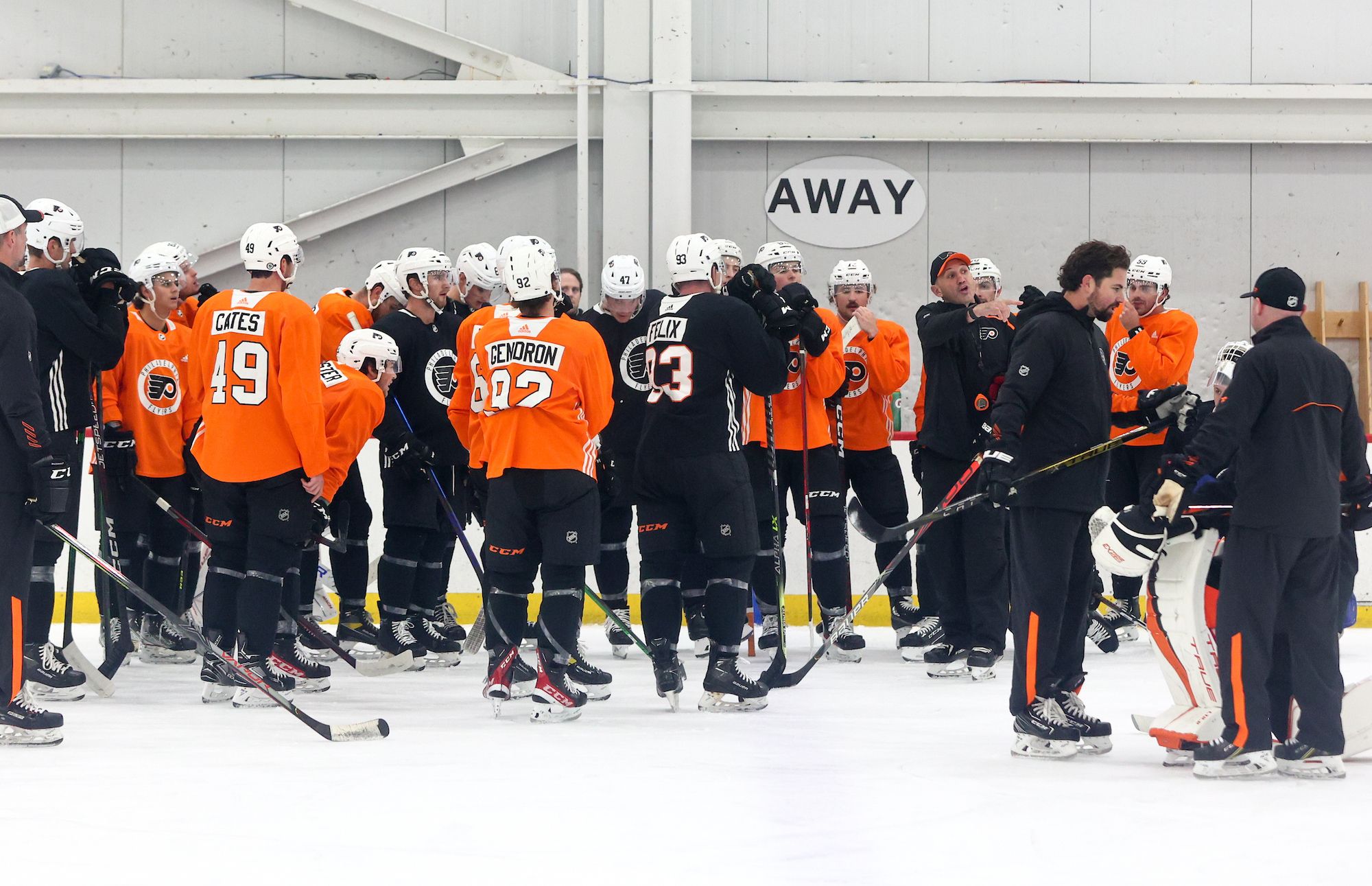Editor’s Note: We try not to stray away from coverage of Flyers hockey too often, but as somebody who makes his livelihood in this new media world, and as somebody who deeply cares about the issues surrounding the coverage of our sport, it’s hard for me to stay silent on this subject for long. If media issues do not interest you, feel free to skip this post. This does have a lot to do with what we do here at BSH on a daily basis, however, so if our motives interest you, please stick with it here. Just beware — there are a lot of words down there.
As a sidebar to the Colin Campbell email incident, which just happened to be researched and made public by excellent Edmonton Oilers blogger Tyler Dellow, a light has again shifted back to the ever-changing relationship between members of the traditional hockey media and members of the new, fan-based Internet media.
The Score put together a great package last week on the topic, featuring comments from Dellow, Julian Sanchez of SB Nation’s Pension Plan Puppets, former SB Nation hockey manager and current Globe & Mail Leafs beat reporter James Mirtle, Steve McAllister of Yahoo! Canada, and Damien Cox of the Toronto Star, who’s often been a critic of the work done in the blogosphere.
It’s a great piece that they’ve put together, and you can see it below.
There’s obviously a lot to comment on here and a lot to debate and discuss. I’ll give my take, as well as a bit of background on how we approach things here at BSH after the jump.
There’s something about generalizations that piss me off more than just about anything. Politics, of course, gives us the best examples. Democrats are whiny elitists who listen to NPR while waiting for another government check. Republicans only watch Fox News and hate poor people.
It works just the same in sports, too. Flyers fans are a bunch of carnivorous pigs. Capitals fans have only been watching hockey since 2005.
None of these statements are true, but so many of us believe them, and as a result, we grow to hate each other.
If Capitals fans have only been watching hockey since 2005, then why should we waste our time talking to them? They clearly don’t know what they’re talking about anyway, right? So what if they show evidence that Mike Green actually can play defense? It doesn’t matter. They don’t have the hockey knowledge we have. They’re from Washington.
And if Flyers fans are a bunch of classless assholes who get everything they want with their fists, then they’re automatically wrong any time they speak up and say something’s wrong with the way their team has been treated, right? So what if there’s evidence to prove it? It doesn’t matter. They’re from Philadelphia.
Generalizations are a way of marginalizing the ideas of people that we disagree with, and as a result, things just turn into a giant pissing match.
Mutual disrespect
Getting to the point here, let’s look at what Damien Cox had to say about bloggers.
Transcribing a bit from his talk with The Score:
I understand that’s part of what people who consider themselves outside the mainstream media — they want to portray themselves as somehow more honest, tougher, nastier. I understand that’s what they want to do and to do it, they try to tear down other people and quite frankly, I think that’s a waste of everybody’s time.
[…]
Part of what concerns me about what I see is that there’s an irresponsibility and no consequences. “I can say whatever I want about anybody and I don’t even have to put my name on it.” I can’t see how that’s good.
[…]
That’s something I hear from people who are bloggers, as though what they’ve identified as “the mainstream media,” somehow they want to suggest that these are all people who have been bought and are protecting the establishment and are not to be trusted. And that’s their schtick. I get it. To the same extent, they feel like they’re outsiders and therefore they’re the only honest people in the business.
It’s all a big load of stereotype from Cox. He talks like bloggers are The Other and that there’s no trusting them. All of ’em. It’s a universal thing.
I’m a blogger. I’m pretty sure I’ve never tried to tear anybody down. Sure, I’ve criticized people when I’ve felt it was necessary and I don’t think any writer — blogger or otherwise — should ever be afraid to do something like that when they have the facts or a strong, fact-based opinion behind them. There’s no apologizing for that, as critique is one of the main functions of journalism.
Clear from his words to The Score, Cox has a label on bloggers as people who are anonymous, irresponsible and unaccountable. They don’t have to answer to anybody, and of course in many cases, that’s the reality. We all know that anybody can start a blog and anybody can get their opinion out there.
But just as anybody can print and distribute their own newspaper if they please, it will only become influential if the work is quality. In blogging, the cream certainly rises to the top. If you do solid work, it gets noticed by people and it gains acclaim and it gets passed around, as was the case with Dellow’s story on the Campbell emails. If there was no evidence to back up what Dellow was saying, that story is dead in the water.
More importantly, though, nobody would ever read Tyler Dellow’s work again (a phenomenon that occurs whether a blogger uses a pen name or not, by the way). To say there’s no accountability in blogging is an incredibly misinformed statement.
But to be fair, this generalization thing goes the other way as well. Dellow touched on it with The Score.
The idea that the mainstream media is somehow a trusted and reliable source just because they aren’t fans of a team — they have all sorts of other interests and all sorts of other reasons to report certain stories, not report other stories or take a certain angle on a story.
This is a common misconception that a lot of people have as well. When reading something that a blogger is writing, it seems and feels a lot closer to what you’re actually thinking because, let’s face it — the blogger is a fan just like you.
Meanwhile, the traditional media writers and reporters are different. They’re not like fans. They answer to their editors who are constantly down their throats about assignments, and they need to keep their sources happy or else they’ll lose they won’t get those assignments done and they’ll lose their jobs and their kids will starve and–
No, that’s not really how it works. That stuff happens, sure, but there’s a general sense sometimes among bloggers and even among a lot of fans that sports journalism works that way and only that way. It’s a bad assumption to work from — a bad generalization to make.
It’s not a matter of trust or ulterior motives. That stuff works itself out, mostly thanks to the very art of journalism or the sheer science that says consumers will read what they believe is quality and trustworthy, and anything else will likely fail. Most journalists are in the game to get the story right, as are most bloggers.
That’s the point to where this all boils down.
The lone difference
There’s really only one major change in hockey coverage that’s come with the advent of social media, blogs and the Internet, and it’s a fairly obvious one.
The angle.
Traditional media members are impartial journalists. Bloggers are fans, or, as nails-against-a-chalkboard as it may sound to anybody who’s been to journalism school (like myself, mind you), fan journalists.
Most of what we do here at BSH is fan journalism, and to brush us off and say what we do isn’t journalism, as many like Cox surely wish to do, isn’t really all that fair. Just because most bloggers didn’t go to J-school doesn’t mean that what that blogger has to say is any less important than what’s written in the Sunday paper, nor does it make it any less sound on a journalistic level.
Here, we provide information and fact-based opinion. We’re beholden to the truth just as is your typical journalist, we provide a forum for meaningful debate, and we’re trusted by our audience to provide an accurate account of what we see. It may be considered a form civic journalism by many, but it is indeed journalism.
Our readers know up front, however, that our account is provided through a different lens, and as it turns out, there’s a hunger for that. People like getting hockey news and opinion from somebody who’s a fan like they are. This debate wouldn’t be happening otherwise.
Cox and many like him have a real problem with this idea, and it’s understandable. It goes against the grain of everything we’re taught as journalists. As he told The Score:
The basic tenet of sports journalism, as far as I’ve been in it, is no cheering in the press box. And some places literally have signs, “no cheering in the press box.” If your primary function is to cheer for the team, then you belong in the stands with the fans.
But despite objection, this is where things are changing, and this is where we get into the depths of what we do here at BSH and what many other great team blogs do around the hockey blogosphere.
As James Mirtle tells The Score, it’s not necessarily a bad thing that there are journalists covering NHL teams that also want them to win the game at the end of the night. As he says, it’s all about the shared experience for the reader. It’s all about knowing that the writer is coming from the same spot you’re coming from.
The motives of a blogger
I’m a fan of the Philadelphia Flyers before anything else. I don’t have any other motives, and I think that as a fan journalist, people understand my motives. I want the Flyers to win the Stanley Cup. Plain and simple. That’s why I wake up and run this Web site every single day.
I’ve been lucky enough to turn it into a livelihood and I’m humbled by the opportunity I have each day to do that, because it’s not something that a lot of people have the chance to do. I’m also lucky enough to be in charge of the hockey wing here at SB Nation, where we have 36 hockey blogs that do great work every single day.
All of our blogs are fantastic, but as is the case with many different newspapers, they tend to have different styles — different approaches to how they cover their teams or their particular subjects. The one thing they all have in common though, at least the blogs that cover a particular team, is that the bloggers run their sites out of a passion for that team.
That’s the goal. We all want our teams to win the Stanley Cup. That’s where our writing is rooted, and it’s not something we should apologize for.
Here at Broad Street Hockey, we’re privileged enough to be credentialed for Flyers games. That’s something I cherish and call a privilege, but I also believe we belong there. There’s a place for us in that press box and in that locker room because it gives a certain depth to our coverage, even if it’s only background. The argument that fans should be in the seats and that they have no purpose in the press box is just silly.
A lot of bloggers, including many of our blogs here at SB Nation, don’t want the access because they’re afraid it will tarnish what they’ve been able to do. It’ll change how they write. Or, they just prefer being on the outside.
I’m not saying that’s a bad thing, because again, we all have different styles. Personally, though, I don’t look at it that way. All the access in the world isn’t going to change the fact that I’m a Flyers fan before all else, and that’s what makes the writing of bloggers so valuable to people reading it.
Cox talks — with a sizable amount of disdain — about how it’s the “outsider perspective” that makes this blogging thing so appealing to readers. If this is really true, then of course we’re not needed in the press box. We’re outsiders. We don’t want to be there anyway. Unfortunately for the detractors who don’t want bloggers in the sacred press box, that “outsider perspective” doesn’t have much to do with why people read blogs.
Maybe I’m wrong or outside the norm, but I started reading blogs because of the shared experience that James Mirtle talks about. I believe that’s why people come to this site everyday. Hell, it’s why I read every comment on this site (although you guys do make it difficult…), it’s why I read every other Flyers blog on the Web and it’s why I read tens of hundreds of other hockey blogs. I care about what other fans think. It’s all about the community we’ve formed. That’s what makes this blogging thing so fun — the shared experience.
As a fan who writes about the Flyers on a daily basis, I know so much more now than I did three months ago before I had access to the Flyers. Each time I step in that press box or that dressing room, I learn something new about this team and about the players and personalities on it, and it definitely enhances my ability to cover this team on a more comprehensive level. It’s become a vital part of what we do here, and for somebody to say we don’t belong there just because we’re fans is pretty ridiculous.
Balancing fanaticism with professionalism
We’re in our first full season of having access to the team. As far as I know, I’m the only fan journalist that’s been to every home game this season, and beyond that, there are just a few others there on a game-by-game basis. We’re a small class here in Philadelphia, as is the case in just about every other NHL press box.
But as someone who’s been there all year thus far, I can tell you that none of us fan journalists in the press box ever outwardly cheer for the team while we’re there. Sure, in my head I’m going nuts when Claude Giroux makes a dazzling pass, and it helps that I can unleash that energy in our GameThreads, but it’s a professional atmosphere.
You just simply don’t outwardly show emotion. You don’t wear your jersey in the press box. You don’t ask for autographs in the locker room (or anywhere). You don’t jump out of your seat when Sergei Bobrovsky makes a ridiculous save. There’s a certain level of decorum, and yes, believe it or not, sports fans can be professional too.
I can only speak to what we do here at BSH, but that professionalism also carries over to what we write.
We take that fan angle. We’re going to be sarcastic and we’re going to poke fun at the other team from time to time and we’re going to write with orange-colored glasses and we’re going to do it without apology. To an extent, I think that gives us the opportunity to be a bit more free in what we say than the typical impartial writer.
We’re allowed to have deep opinions on the game, and those opinions carry a lot of weight because, again, at the end of the day, our opinions are an extension of the hope for that ultimate prize at the end. We’re not just writing to make a living. We’re writing because we love our team.
That doesn’t mean we aren’t critical, of course. We’re certainly not all “rah rah! Go Flyers! woo!” around here, and anybody who reads this site regularly knows that all too well. I’d say that more often than not, we’re in a position to be more critical than even the most impartial of the traditional members of the media, and it’s not because we don’t have sources or anything absurd like that. No, it’s much simpler than that.
We want the team to win and we’re allowed to wear it on our sleeves. If Jeff Carter is playing poorly, we’re going to say it because we want him to get better. We want what’s best for the hockey team. That’s what it all comes down to at the end of the day. And really, I’ve always thought that’s the way it should be.
Room for everybody
Sports are inherently biased, right? At the core, it’s all about you-versus-me, us-versus-them. There’s no reason that all the writing around sports should be rooted in impartiality. After all, impartiality is something that really has no place in the sports experience for the most important people involved — the fans.
That’s not to say impartial reporting isn’t needed in sports. It obviously is, and that’s where the nexus between traditional media and fan media can become more of a partnership and less of a head-on collision. While it’s certainly a war between the two parties in many places around the NHL map, I think we’re sorting it out pretty well here in Philadelphia.
We typically don’t report news here at BSH. We don’t have the sources to do that sort of thing and we’re not in that business. Leave that up to the traditional journalists. We cite those guys and girls every single day on this site and we’re happy to do it. It’s not what we do.
Here, we’re in the analysis game. We’re in the commentary game. We’re in the understanding-the-sport game. We’re in the figuring-out-what-the-Flyers-need-to-do-to-win-the-Cup game. When news breaks, we analyze it. We try to understand it. We try to figure out just how this is going to impact the Flyers’ chances at winning hockey games.
We use numbers and we use facts to get a better, more in-depth understanding of what’s going on with this team. That’s what we try to do, and I think to this point, we’ve done a pretty solid job at it. The traditional journalists in this town have taken notice, too. More and more, our work is being cited in print around here.
The mutual respect that for some reason missing in many other places seems pretty evident, at least as we’re involved, here in Philadelphia. I don’t mean to imply that everything is all rosy and perfect here. We have to continue doing good work to prove we belong. After all, we’re the new guy, right? A guy like Wayne Fish has been covering the Flyers for almost 30 years, and here we come strolling in thinking we’re equal.
No, it takes time to build up that respect. I think that’s understood, but that also doesn’t mean that we should be shrugged off like we’re just a bunch of pesky fans that don’t belong, as guys like Damien Cox seem to suggest all too often.
All it takes is a little open-mindedness. A little less of the “bloggers are the boogieman” mentality. Traditional media has a place here. Fan media has a place here. It’s really not as complicated as all the fighting makes it seem.









